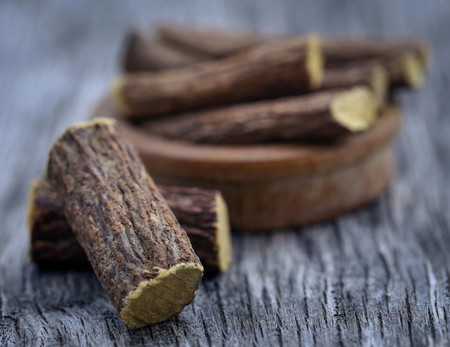Licorice root has been used for centuries as a natural remedy for various ailments. It contains a compound called glycyrrhizin, which gives it a distinctive sweet taste and has been associated with several health benefits.
However, licorice root also has potential side effects and interactions with other herbs and supplements, making it important to understand its effects before use.
For nursing mothers, the question arises whether licorice root is safe to consume while breastfeeding. While there is limited research on the topic, some studies suggest that licorice root may have potential benefits for nursing mothers, such as increasing breast milk production and reducing inflammation.
However, it is crucial to understand the potential risks and consult with a healthcare professional before using any herbal supplement while breastfeeding.
Key Takeaways
- Licorice root contains glycyrrhizin and has been used for centuries as a natural remedy.
- Limited research suggests that licorice root may have potential benefits for nursing mothers, but it is important to understand the potential risks and consult with a healthcare professional before use.
- Interactions with other herbs and supplements and the potential for side effects make it crucial to understand the effects of licorice root before use.
Understanding Licorice Root

Licorice root, also known as Glycyrrhiza glabra, is a plant that has been used for medicinal purposes for centuries. It is a member of the legume family and is native to Europe and Asia. The root of the licorice plant contains glycyrrhizin, which gives it its characteristic sweet taste and also has medicinal properties.
Licorice root has been used for its therapeutic properties, including its anti-inflammatory, anti-oxidant, anti-viral, and anti-fungal effects. It has been used to treat a variety of conditions, including coughs, sore throats, and digestive issues.
However, it is important to note that licorice root should be used with caution, especially by breastfeeding mothers. The glycyrrhizin in licorice root can increase blood pressure and may cause water retention.
It may also affect the hormonal balance in the body, which can be particularly concerning for breastfeeding mothers.
In addition, licorice root may interact with certain medications, including those used to treat high blood pressure and diabetes. It is important to speak with a healthcare provider before using licorice root, especially if you are breastfeeding or taking any medications.
Overall, while licorice root has many potential medicinal properties, it is important to use it with caution and under the guidance of a healthcare provider, especially while breastfeeding.
Licorice Root and Breastfeeding
Licorice root is a popular herb that has been used for centuries to treat various ailments. However, its use during breastfeeding is a controversial topic.
Some studies suggest that licorice root can stimulate lactation and increase milk production, while others warn against its use due to potential side effects.
For nursing mothers who are struggling with insufficient milk supply, licorice root may be a tempting option. However, it is important to note that there is limited research on the effects of licorice root on breastmilk production.
Some studies suggest that it may increase milk supply, while others have found no significant effect.
It is also important to note that licorice root contains glycyrrhizin, a compound that can have negative effects on both the mother and the baby. Glycyrrhizin can cause high blood pressure, edema, and electrolyte imbalances in the mother, while also affecting the baby’s hormonal balance and causing developmental issues.
Therefore, nursing mothers should exercise caution when considering the use of licorice root. It is recommended that they consult with a healthcare provider before using any herbal supplements, including licorice root.
In summary, while licorice root may have some potential benefits for breastfeeding mothers, its use should be approached with caution. More research is needed to determine its safety and effectiveness, and nursing mothers should always consult with a healthcare provider before using any herbal supplements.
Potential Benefits of Licorice Root for Nursing Mothers

Licorice root has been used for centuries in traditional medicine for its various health benefits. It is known to contain several compounds that have anti-inflammatory, antimicrobial, and antioxidant properties.
Nursing mothers can also benefit from consuming licorice root as it may help with several health issues they may face.
1 Digestive Issues
Licorice root has been shown to have a soothing effect on the digestive system, making it helpful for nursing mothers who may experience digestive issues such as bloating, gas, and constipation.
It contains compounds that can help increase the production of mucus in the stomach, which can help protect the stomach lining from damage caused by stomach acid.
2. Sore Throat and Cough
Licorice root has been traditionally used as a natural remedy for sore throat and cough. It contains compounds that can help soothe the throat and reduce inflammation. Nursing mothers who are experiencing these symptoms may benefit from consuming licorice root.
3. Stress and Anxiety
Licorice root has been shown to have an adaptogenic effect, which means it can help the body adapt to stress. Nursing mothers who are experiencing stress and anxiety may benefit from consuming licorice root as it may help them feel more relaxed and calm.
4. Water Retention
Licorice root has been traditionally used as a natural diuretic, which means it can help increase urine production and reduce water retention. Nursing mothers who are experiencing water retention may benefit from consuming licorice root.
5. Liver Disease
Licorice root has been shown to have a protective effect on the liver. It contains compounds that can help reduce liver damage caused by toxins and inflammation. Nursing mothers who have liver disease may benefit from consuming licorice root.
6. Cataracts
Licorice root contains compounds that have been shown to have a protective effect on the eyes. It may help prevent the development of cataracts, which is a common eye condition that can occur in nursing mothers.
Overall, licorice root can be a beneficial addition to a nursing mother’s diet. However, it is important to note that consuming too much licorice root can be harmful, especially for those with certain medical conditions.
Nursing mothers should consult with their healthcare provider before consuming licorice root.
Possible Side Effects of Licorice Root

While licorice root has been used for centuries for its medicinal properties, it is important to be aware of its possible side effects, especially when breastfeeding.
Here are some of the potential side effects of licorice root:
1. High Blood Pressure and Hypertension
Licorice root contains glycyrrhizin, a compound that can cause an increase in blood pressure and lead to hypertension. This effect is more pronounced in people who are already susceptible to high blood pressure.
Breastfeeding mothers with hypertension or a history of hypertension should avoid licorice root.
2. Hypokalemia
Licorice root can also cause hypokalemia, a condition where potassium levels in the body become dangerously low. This is because glycyrrhizin inhibits an enzyme that regulates potassium levels in the body.
Hypokalemia can lead to muscle weakness, fatigue, and even paralysis. Breastfeeding mothers who experience these symptoms should discontinue the use of licorice root.
3. Severe Headaches
Licorice root can cause severe headaches in some people. This is because it can cause blood vessels in the brain to constrict, leading to headaches. Breastfeeding mothers who experience severe headaches after consuming licorice root should avoid it.
4. Weight Gain
Licorice root can cause weight gain in some people. This is because it can increase levels of the hormone cortisol, which can lead to increased appetite and fat storage. Breastfeeding mothers who are concerned about weight gain should avoid consuming licorice root.
5. Amenorrhea and Miscarriage
Licorice root can also affect estrogen levels in the body. This can lead to amenorrhea, a condition where menstruation stops. In pregnant women, licorice root can increase the risk of miscarriage. Breastfeeding mothers who are pregnant or trying to conceive should avoid consuming licorice root.
6. Preterm Labor
Licorice root can also cause preterm labor in pregnant women. This is because it can stimulate contractions in the uterus. Breastfeeding mothers who are pregnant or trying to conceive should avoid consuming licorice root.
In conclusion, while licorice root has many potential health benefits, it is important to be aware of its possible side effects, especially when breastfeeding. Breastfeeding mothers should consult with their healthcare provider before consuming licorice root.
Interactions with Other Herbs and Supplements
When taking licorice root while breastfeeding, it’s important to be aware of potential interactions with other herbs and supplements. Some herbs and supplements may interact with licorice root, leading to adverse effects on both the mother and the baby.
Anise, fennel, and fenugreek are commonly used herbs for increasing milk production in lactating mothers. While these herbs are generally considered safe, they may interact with licorice root and cause an increase in blood pressure or other adverse effects.
Sage is another herb that may interact with licorice root. Sage is often used to decrease milk production in lactating mothers, but it may also cause a decrease in milk supply when taken in combination with licorice root.
Goat’s rue is a herb that is sometimes used to increase milk production in lactating mothers. However, it may interact with licorice root and cause an increase in blood pressure.
Buckthorn, elecampane, rhubarb, and black walnut are herbs that should be avoided while breastfeeding, as they may have harmful effects on both the mother and the baby. These herbs may also interact with licorice root and cause adverse effects.
Thyme, yarrow, bladderwrack, chaparral, and uva ursi are herbs that may interact with licorice root and cause an increase in blood pressure or other adverse effects. It’s important to talk to a healthcare provider before taking these herbs while breastfeeding.
Wormwood, lemon balm, oregano, ashwagandha, and wild asparagus are herbs that are generally considered safe to take while breastfeeding. However, they may interact with licorice root and cause adverse effects.
It’s important to talk to a healthcare provider before taking these herbs in combination with licorice root.
Overall, when taking licorice root while breastfeeding, it’s important to be aware of potential interactions with other herbs and supplements. It’s recommended to talk to a healthcare provider before taking any herbs or supplements while breastfeeding.
Understanding Glycyrrhizic Acid
Licorice root contains a compound called glycyrrhizic acid, which has been shown to have potential health benefits. However, it is important to understand the potential risks associated with consuming glycyrrhizic acid, especially for breastfeeding mothers.
Glycyrrhizic acid has been shown to have both positive and negative effects on the body. On one hand, it has been shown to have anti-inflammatory and antioxidant properties, which can help to reduce inflammation and oxidative stress in the body.
However, glycyrrhizic acid can also have negative effects on the body, particularly on the adrenal glands. The adrenal glands are responsible for producing hormones such as cortisol, which help to regulate the body’s stress response.
Consuming large amounts of glycyrrhizic acid can lead to an increase in cortisol levels, which can cause a range of negative side effects such as high blood pressure, fluid retention, and decreased potassium levels.
In extreme cases, consuming large amounts of glycyrrhizic acid can even lead to adrenal insufficiency, which can be life-threatening.
For breastfeeding mothers, it is important to be aware of the potential risks associated with consuming glycyrrhizic acid. While small amounts of licorice root are generally considered safe, consuming large amounts or taking licorice root supplements can be risky.
Overall, it is important to approach the consumption of glycyrrhizic acid with caution, especially for breastfeeding mothers. While it may have potential health benefits, it is important to be aware of the potential risks and to consult with a healthcare professional before consuming licorice root or any other supplements.
Regulation and Recommendations
When it comes to consuming licorice root while breastfeeding, there are several regulations and recommendations to consider. The safety of licorice root during breastfeeding is a topic that has been studied extensively, and there are some concerns that need to be addressed.
The United States Food and Drug Administration (FDA) considers licorice root to be a dietary supplement. As such, it is not regulated in the same way as prescription medications or over-the-counter drugs.
However, the FDA does have guidelines for the manufacturing and labeling of dietary supplements, which manufacturers are required to follow.
It is important to note that licorice root can interact with certain medications and health conditions. Therefore, healthcare providers should be consulted before consuming licorice root while breastfeeding.
They can advise on the safety of licorice root based on an individual’s medical history and current health status.
There are also some general recommendations that can be followed when consuming licorice root while breastfeeding. These include:
- Limiting consumption: It is recommended to limit licorice root intake to no more than 30-50 grams per day.
- Choosing high-quality products: When purchasing licorice root, it is important to choose products from reputable manufacturers that follow good manufacturing practices.
- Monitoring for side effects: Some individuals may experience side effects such as high blood pressure, headaches, and fatigue when consuming licorice root. If any adverse effects are experienced, consumption should be stopped immediately.
Overall, licorice root can be consumed safely while breastfeeding as long as proper precautions are taken. It is important to follow the recommendations of healthcare providers and limit consumption to avoid any potential adverse effects.
Conclusion
In conclusion, consuming licorice root while breastfeeding requires careful consideration and consultation with a healthcare provider. While licorice root has been used for centuries as a medicinal herb, there is limited scientific evidence to support its safety and efficacy during lactation.
Based on the available research, it appears that licorice root may have some potential benefits for breastfeeding mothers, such as improving milk production and reducing inflammation. However, it also has potential risks, including decreasing milk supply and causing hormonal imbalances.
Therefore, it is important for breastfeeding mothers to exercise caution when consuming licorice root and to monitor their milk supply and overall health. It is also recommended to limit consumption to small amounts and avoid high doses or prolonged use.
Overall, while licorice root may have some potential benefits for breastfeeding mothers, it is important to approach its use with caution and to seek guidance from a healthcare provider before incorporating it into one’s diet.
Related Posts:
Frequently Asked Questions
Is it safe to consume licorice root while breastfeeding?
Consuming licorice root in small amounts is generally considered safe while breastfeeding. However, it is recommended to consult with a healthcare provider before consuming licorice root, especially in large amounts or for prolonged periods of time.
Are there any risks associated with consuming licorice root while breastfeeding?
Consuming large amounts of licorice root can lead to an increase in blood pressure and a decrease in potassium levels, which can cause health problems. Additionally, licorice root may interfere with certain medications, so it is important to consult with a healthcare provider before consuming it.
What are some alternative herbs to consume while breastfeeding?
There are many alternative herbs that are safe to consume while breastfeeding, including chamomile, ginger, fennel, and raspberry leaf. It is important to consult with a healthcare provider before consuming any herbs while breastfeeding.
Can I consume throat coat tea while breastfeeding?
Throat coat tea is generally considered safe to consume while breastfeeding. However, it is important to check the ingredients of the specific brand of throat coat tea, as some may contain herbs that are not recommended for breastfeeding mothers.
Is it safe to consume slippery elm while breastfeeding?
Slippery elm is generally considered safe to consume while breastfeeding. However, it is recommended to consult with a healthcare provider before consuming slippery elm, especially in large amounts or for prolonged periods of time.
Are there any teas I should avoid while breastfeeding?
There are some teas that should be avoided while breastfeeding, including sage tea, parsley tea, and peppermint tea. These teas can decrease milk supply and may cause other health problems. It is important to consult with a healthcare provider before consuming any teas while breastfeeding.

Iesha is a loving mother of 2 beautiful children. She’s an active parent who enjoys indoor and outdoor adventures with her family. Her mission is to share practical and realistic parenting advice to help the parenting community becoming stronger.
